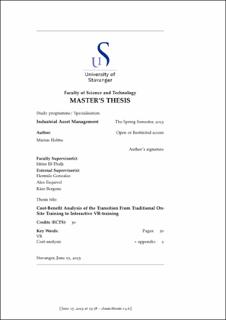| dc.description.abstract | Virtual Reality (VR) is increasing in popularity as a training tool. The recent development of head-mounted displays (HMDs) that have become affordable and more companies starting to use VR, have made VR a popular research topic. The research on advantages such as increased knowledge retention, engagement, confidence, focus, and more have made it interesting for companies to invest in the technology. There are also some disadvantages like VR sickness and situations where VR is not as suitable such as memorization of academic material and fine motor training. The main focus of the research and results of use-cases have been on the pros and cons of VR, but there is little information available regarding the financial aspect. Therefore this thesis aims to show whether VR-based interactive training can be a competitive method to the traditional training methods from a financial and training effectiveness point of view.
This will be done through a review of studies, reports and use-cases on VR-training to create a foundation for making the decision to go for VR. The financial aspect will be shown through a simple cost-benefit analysis on two different scenarios that applies to different aspects of the usefulness of VR.
The thesis concludes that VR can be a competitive method to the traditional training methods based on the results of the two scenarios. The cost of VR is drastically reduced when the program can be standardized and sold without customization or with limited customization. The customized programs are still expensive but can be beneficial depending on the time frame of the project and needs of the training. | |
